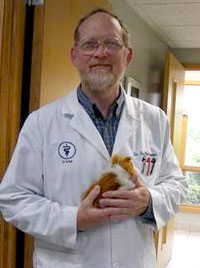01 Oct October 1 Update on Dan Paternoster

Dan Paternoster
Dan Paternoster, who was struck by a car on August 28 while riding his bike, continues to make progress, albeit slowly. Here are recent excerpts posted to CarePages.com by Dan’s wife, Nancy, during the past week. Dan, a veterinarian from the UB church in Fowlerville, Mich., is a member of denominational the Executive Leadership Team.
Wednesday, September 26. Walking up and down the stairs was Dan’s job for today, along with standing and kicking a ball. He did both things with help. Balance is something we take for granted until we have to learn to balance all over again.
Dan is progressing with his speech therapist, too but not as fast as in the physical areas. This area is frustrating to both of us. There are so many words in Dan’s head that it takes him a long time to recall the word that he wants. Sometimes he just uses other words in his sentences that don’t make any sense to us, but seem fine to him since he knows what he’s trying to say. Please pray specifically that his language recall and communication would improve tremendously this coming week.
Thursday, September 27. Still working on balance with sidestepping while playing catch. He’s gettng better with this. Since Dan is getting steadier on his feet, we requested his physical therapist to give us pointers on helping Dan transfer from the wheelchair to his bed and in the bathroom. It will be easier for Dan not having to wait for nursing staff to come each time he wants to transfer. There were several sentences that Dan said today that made total sense. Keep praying for this area. Dan will be having a swallow study done soon and if okay, then will be able to move on to food on a regular basis.
Friday, September 28. Today was a tiring day. Dan practiced swallowing by eating oatmeal and drinking cranberry juice. He’ll have a swallow study done on Monday and will be given more food if that study goes well. Dan also matched cards by suits and identified which item didn’t belong in each picture. He finished physical therapy by walking up and down a small hill. Dan’s sentences made more sense at times today, but please keep praying for complete healing in this area.
Sunday, October 1. Dan’s memory of names of objects and how to do simple tasks is returning slowly.







 Kilburn Avenue UB church (Rockford, Ill.) baptized five people on September 16, with 50+ people present. Pastor Barry Skinner reports, “Another four and possibly two more people want to be baptized next month, and another couple wants me to marry them in the church. New people are getting involved in ministry of the church.”
Kilburn Avenue UB church (Rockford, Ill.) baptized five people on September 16, with 50+ people present. Pastor Barry Skinner reports, “Another four and possibly two more people want to be baptized next month, and another couple wants me to marry them in the church. New people are getting involved in ministry of the church.”